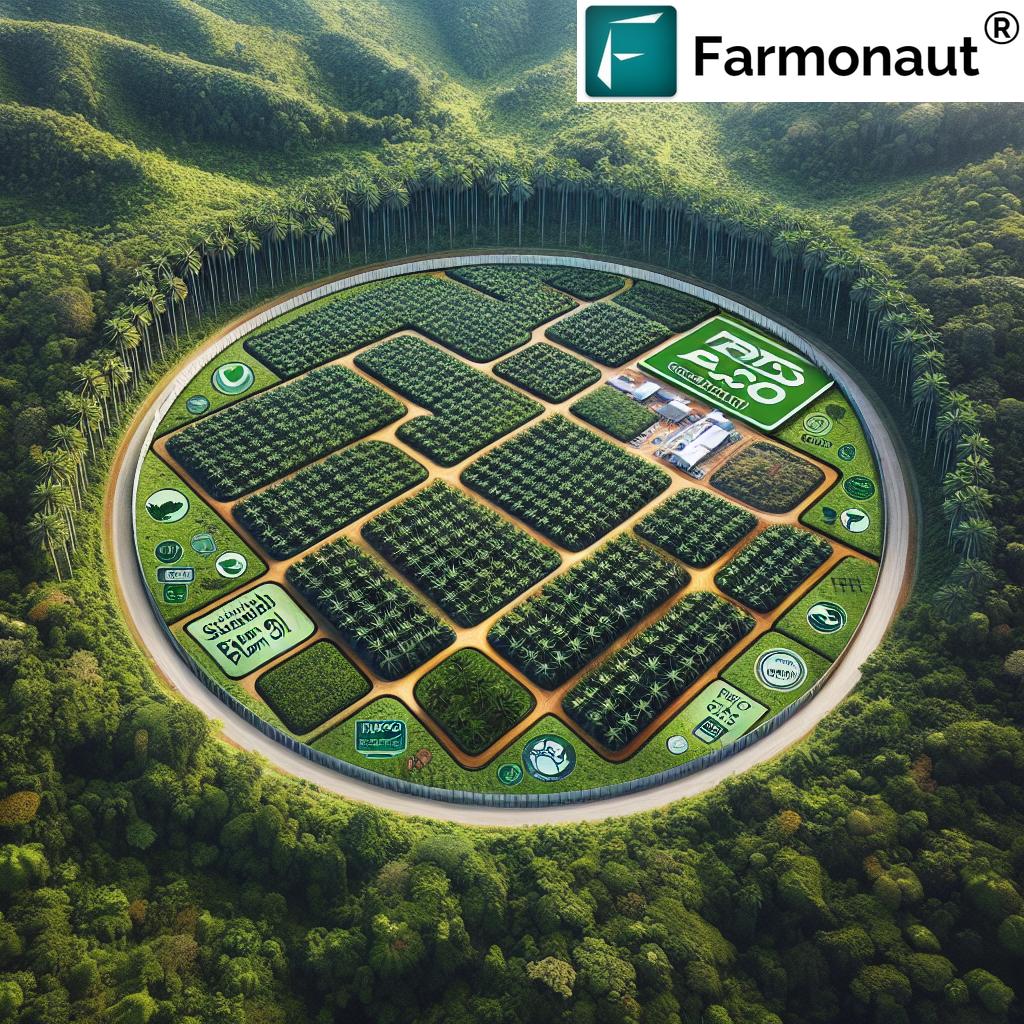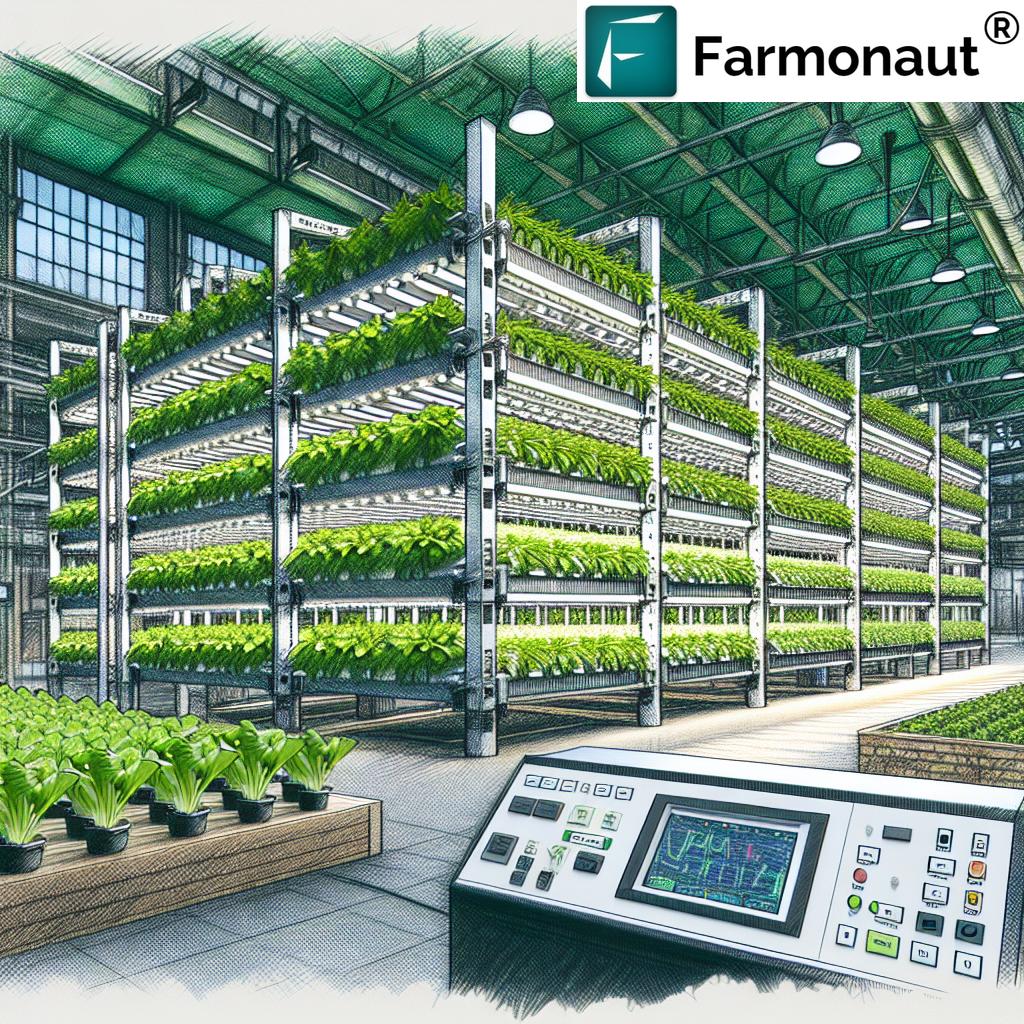Deforestation Free Sustainable Palm Oil: 7 Shocking Hacks!
“Over 19% of global palm oil production is now RSPO certified, promoting deforestation-free and sustainable practices.”
Table of Contents
- Introduction
- The Devastating Impact of Palm Oil Cultivation
- Defining Deforestation-Free Sustainable Palm Oil
- Challenges to Achieving Deforestation-Free Palm Oil
- 7 Shocking Hacks for Deforestation-Free Sustainable Palm Oil
- Farmonaut: Revolutionizing Palm Oil Supply Chain Traceability & Sustainability
- Comparative Benefits Table: Deforestation-Free vs. Conventional Palm Oil
- RSPO Certification & Standards: The Pillars of Sustainable Palm Oil
- Consumer Responsibility and Market Demand
- Frequently Asked Questions
- Conclusion
Introduction: Why Deforestation-Free Sustainable Palm Oil Matters
Welcome, friends and fellow sustainability advocates. Today, we embark on an eye-opening journey into the world of sustainable palm oil, exploring how deforestation-free palm oil, robust supply chain traceability, and credible RSPO certification can be true game-changers in the global effort to combat climate change, preserve biodiversity, and promote ethical, climate-friendly industry practices. The palm oil story is both cautionary and hopeful—let’s decode the myths, facts, and innovations that are shifting the industry toward a greener, more responsible future.
Palm oil, derived from the vibrant Elaeis guineensis fruit, is the world’s most versatile and widely used vegetable oil. It’s found in around 50% of supermarket products, from food and cosmetics to household goods. Yet, this omnipresence has come at a significant environmental cost, making our choices as consumers more important than ever.
The Devastating Environmental Impact of Palm Oil Cultivation
The global palm oil industry has been a leading driver of tropical deforestation, especially across Southeast Asia—notably Indonesia and Malaysia. Between 1990 and 2005, a staggering 2.7 million hectares of tropical forests vanished under the rapid expansion of oil palm plantations. This rampant deforestation destroyed critical habitat, triggered substantial loss of biodiversity, and released massive amounts of greenhouse gases—propelling climate change to dangerous new heights.
- Biodiversity Loss: Home to endangered species like the orangutan and Sumatran tiger, Southeast Asian forests are some of the most biodiverse on Earth. Their destruction causes irreparable harm to both flora and fauna.
- Carbon Emissions: Deforestation and peatland conversion for palm oil release significant carbon into the atmosphere, worsening the palm oil environmental impact.
- Loss of Livelihoods: Indigenous communities and local farmers often lose access to resources needed for traditional livelihoods.
We must address these urgent challenges by promoting sustainable palm oil production and pushing for verifiable deforestation-free supply chains.
Defining Deforestation-Free Sustainable Palm Oil
Deforestation-free sustainable palm oil refers to the stricter, responsible production of palm oil that directly avoids contributing to forest destruction—especially in primary and high-conservation-value areas. But what exactly does this concept encompass? Here’s what sets it apart:
- No Deforestation: No new plantations encroach upon untouched forested zones—especially not pristine rainforests or other irreplaceable environmental treasures.
- No Peat: Palm cultivation must avoid carbon-rich peatlands, which are vital for storing carbon and moderating climate.
-
No Exploitation: Strict protection of fair labor practices and human rights throughout every level of the supply chain.
Fairness and dignity are not optional. - Comprehensive Traceability: Companies must be able to verify and track palm oil origins—ensuring the entire supply chain complies with deforestation-free standards.
- Transparency Standards: Sustainability commitments must be public, bold, and open to ongoing scrutiny.
In summary, achieving sustainable palm oil production not only benefits our environment—it protects smallholder farmers, strengthens community resilience, and empowers the ethical consumer. It’s about preserving critical value areas while uplifting the global community.
Challenges to Achieving Deforestation-Free Palm Oil
Ensuring a palm oil industry that is genuinely deforestation-free is complex and multi-faceted. Let’s unpack the main barriers:
- Fragmented Supply Chains: Palm oil often flows through multiple intermediaries—from plantation to refiner to finished product—making origin tracking tricky.
- Certification Gaps: While vital, RSPO certification standards do not always cover all forest types or prevent all forms of conversion, particularly when it comes to degraded or secondary lands.
- Lack of Traceability: Without robust, technology-powered solutions, it can be difficult for companies and consumers to verify the true deforestation status of each product.
- Sustainability Skepticism: Concerns about greenwashing and non-transparent claims cast doubt on the credibility of many palm oil sustainability initiatives.
- Economic Pressures: Smallholder palm oil farmers face challenges in accessing resources for certification and adopting ethical agricultural practices without robust support systems.
In our pursuit of deforestation-free palm oil, we must confront these structural obstacles directly—through innovative technologies, transparent certification, supportive regulation, and empowered, informed consumer choice.
7 Shocking Hacks to Achieve Deforestation-Free Sustainable Palm Oil
How can we truly advance the movement for deforestation-free sustainable palm oil? Here are seven actionable solutions—backed by science, technology, and responsible business strategies—you can support today.
-
Leverage Next-Gen Traceability Tech
State-of-the-art satellite data, geolocation mapping, and blockchain systems are transforming palm oil supply chain traceability. This means we can now:
- Track palm oil from plantation to product shelf in real time
- Instantly flag illegal logging, land encroachment, and plantation expansion in restricted value areas
- Enhance transparency for producers, buyers, and consumers alike
Companies like Farmonaut are at the forefront, offering product traceability solutions powered by satellite imagery and blockchain.
Bonus: Businesses can also explore API access for seamless system integration, or check the API Developer Documentation for technical details. -
Support and Empower Smallholder Palm Oil Farmers
Smallholder farmers are vital—representing more than 40% of palm oil production globally yet lacking access to resources for sustainable production and RSPO certification. By championing direct sourcing models and providing:
- Affordable precision agriculture tools (like those from Farmonaut)
- Fair market access and financial support
- Training for ethical, climate-friendly farming
…we promote greater equity and environmental protection throughout the supply chain.
-
Insist on RSPO Certification and Continuous Improvement
The Roundtable on Sustainable Palm Oil (RSPO) remains the most robust and widely recognized certification system in the industry. But we must also:
- Push for ongoing upgrades to standards that include all types of forest and high conservation value areas
- Incentivize ‘beyond RSPO’ programs for additional environmental and social performance
Look for products and companies openly displaying their RSPO certification and supporting robust carbon footprint tracking to ensure real impact.
-
Invest in Conservation and Restoration Initiatives
Leading companies and NGOs are restoring deforested or degraded areas, especially in Indonesia and Malaysia. Such initiatives:
- Enhance ecological value and improve biodiversity outcomes
- Offset past deforestation and reduce future greenhouse gas emissions
Consumers and brands alike must prioritize conservation—supporting efforts like forest plantation advisory systems from tech innovators such as Farmonaut.
-
Advocate for Regulatory Compliance and Stronger Laws
Regulatory efforts like the European Union’s Deforestation Regulation (EUDR) are vital. This law requires that palm oil and derivative products entering the EU must not be linked to deforestation. Strong regulations:
- Compel global brands to source responsibly
- Penalize companies that violate supply chain transparency or certification standards
Let’s encourage our lawmakers to make similar regulations a global norm!
-
Choose and Reward Ethical, Transparent Companies
Consumer demand is a powerful market force. By purchasing from brands with public RSPO certification, detailed traceability, and outstanding sustainability reports, we:
- Signal that sustainability is non-negotiable
- Reward companies that are making a measurable impact
- Drive the market away from deforestation-linked goods
Tools like Farmonaut’s traceability dashboards give producers and buyers the upper hand in this process.
-
Implement Carbon Footprint Monitoring and Reporting
Tracking carbon emissions not only supports climate goals but also enhances consumer trust. Modern carbon footprinting solutions—like Farmonaut’s Carbon Footprinting module—enable:
- Estimation and reduction of greenhouse gas emissions for every plantation or lot
- Clear sustainability metrics for producers and buyers
Fact: Sustainable palm oil must go beyond simply being “deforestation-free”—it must be low-carbon and regenerative to truly support planetary health.
“Traceable palm oil supply chains can reduce illegal deforestation by up to 50%, supporting climate change mitigation.”
Farmonaut: Revolutionizing Palm Oil Supply Chain Traceability & Sustainability
Let’s zoom in on how cutting-edge technology can accelerate our journey toward sustainable palm oil production—specifically, the comprehensive suite of tools Farmonaut offers to the palm oil industry, farmers, and sustainability stakeholders.
- Satellite Crop Health Monitoring: Farmonaut’s platform delivers precise crop health and soil moisture analytics via satellite imagery—crucial for both large plantations and smallholder palm oil farmers. It enables early detection of issues, precise input management, and efficient resource allocation.
- AI & Blockchain-Powered Traceability: The traceability module leverages blockchain to track every stage in the palm oil supply chain—offering verifiable transparency and building consumer trust.
- Jeevn AI Advisory System: Farmonaut’s Jeevn AI delivers actionable advice—blending real-time field data, best agricultural practices, and tailored recommendations to farmers through web, Android, and iOS apps.
- Carbon Footprinting: With carbon emission tracking, palm oil companies can monitor the impact of their operations and proactively meet global regulatory compliance.
- Resource and Fleet Management: Farmonaut’s fleet management solutions streamline logistics, reduce costs, and minimize operational carbon footprints for plantations and agribusinesses.
Our Value Proposition: By integrating AI, satellite imagery, and blockchain, Farmonaut is democratizing access to precision agriculture, making sustainable farming both affordable and achievable for all. The platform is designed for scalability—serving individual farmers, agribusinesses, corporates, governments, and more.
Explore Farmonaut’s large scale farm management offering, designed for plantation managers and large operators who demand real-time data and comprehensive oversight across thousands of hectares.
Why Does Farmonaut Stand Out Among Palm Sustainability Tech Platforms?
- Affordability: No expensive hardware—just powerful satellite-driven insights at your fingertips
- Transparency: End-to-end industry visibility, from farmers to corporates to the final consumer
- Environmental Compliance: Integrated carbon footprinting and product traceability facilitate regulatory compliance
- Farmer Empowerment: Smallholder organizations and individual farmers can access the same tools as large agribusiness
Comparative Benefits Table: Deforestation-Free vs. Conventional Palm Oil
Quantifying the sustainability impact of deforestation-free palm oil versus conventional practices helps all of us make informed, ethical choices. Here’s a side-by-side snapshot of critical metrics:
Key takeaway: Robust certification, effective traceability, and proactive conservation lead to measurable reductions in carbon emissions, prevented habitat loss, and higher transparency throughout the palm oil supply chain.
RSPO Certification & Standards: The Pillars of Sustainable Palm Oil
The Roundtable on Sustainable Palm Oil (RSPO) is a multi-stakeholder initiative creating and updating global standards for sustainable palm oil production. Let’s delve into why RSPO certification and other rigorous schemes are so vital:
- Holistic Standards: RSPO principles govern every stage of the supply chain, including environmental conservation, social equity, and economic sustainability.
- High Conservation Value (HCV): Certified plantations must identify and protect HCV areas, safeguarding endangered species and unique ecosystems.
- Ongoing Audits & Transparency: Certification is not “one and done”—ongoing audits ensure standards are maintained, and updates continuously reflect best practices as the industry rises to new climate and ethical challenges.
- Market Power: Over 19% of the world’s palm oil is now RSPO certified. As demand grows, RSPO-certified oil is set to become the global sustainability standard.
It’s up to us as consumers and professionals to promote and demand RSPO certification—and to support brands who lead by example in environmental stewardship.
Consumer Responsibility and Ethical Market Demand
The journey to a deforestation-free palm oil industry begins with all of us. Here’s what we can do:
- Buy Smart: Look for sustainability labels and certifications (like RSPO) when purchasing food, cosmetics, or household items. Apps and online resources can help verify claims.
- Engage and Advocate: Ask companies tough questions about palm oil origins, certification coverage, and supply chain transparency. Demand detailed, reliably sourced sustainability reports.
- Reject Greenwashing: Not all “sustainable” labels are created equal. Seek out brands who invest in third-party verification (like blockchain-powered traceability) and can provide verifiable data—not just promises.
- Promote Inclusion: Support products and programs that uplift smallholder farmers through education, fair access to markets, and robust certifications.
- Share Knowledge: Use your platforms—social media, community organizations, and purchasing decisions—to educate others about the importance of sustainable, deforestation-free palm oil.
Together, our choices drive market transformation and pressure companies, governments, and producers to prioritize ethical, climate-positive practices.
For those who want to deep dive with trusted, real-time insights on palm oil supply chain sustainability, check out the capabilities of Farmonaut—pioneering traceability and resource optimization for a better world.
Affordable Subscriptions for Precision Agriculture
FAQs: Deforestation-Free Sustainable Palm Oil
What is deforestation-free palm oil?
Deforestation-free palm oil refers to palm oil produced without the destruction of forests, especially untouched rainforests and high conservation value areas. The approach requires strict supply chain traceability, transparency, and compliance with global sustainability standards.
Why is palm oil linked to climate change?
Palm oil plantations are a significant source of greenhouse gas emissions due to large-scale forest clearance and peatland conversion in tropical countries like Indonesia and Malaysia. By shifting to deforestation-free, sustainable palm oil, we reduce carbon emissions and help combat climate change.
How does RSPO certification support sustainability?
The RSPO sets global criteria for environmental, social, and economic best practices. Certification ensures that palm oil is sourced without exploitation or deforestation, with ongoing audits to promote transparency and improvement.
What role do consumers play in supply chain sustainability?
By choosing certified products, demanding supply chain transparency, and supporting brands with robust environmental commitments, consumers drive market demand for ethical, responsible production.
How does Farmonaut help the palm oil industry adopt sustainable practices?
Farmonaut provides advanced tools—from real-time satellite crop monitoring and AI advisories to blockchain-powered traceability and carbon reporting. These solutions make it easier for farmers, agribusinesses, and corporates to transition to sustainable palm oil production at scale.
How can smallholder farmers achieve RSPO certification?
Smallholders can leverage affordable, accessible precision agriculture tools, seek out training in sustainable farming, and partner with organizations that provide certification support and fair market access.
Conclusion: A Greener, Fairer Future With Deforestation-Free Sustainable Palm Oil
Palm oil is not inherently unsustainable, but its conventional production often ravages forests, shifts climate patterns, and undermines social equity. Transitioning to deforestation-free palm oil—anchored in advanced traceability, transparent certification, innovative technology, and holistic regulatory compliance—is not just possible, but essential for our collective future.
Each one of us—consumers, farmers, businesses, and policymakers—holds the power to demand and create change. With the support of pioneering platforms like Farmonaut—offering real-time monitoring, blockchain traceability, and carbon footprinting—we can all become stewards of our planet, safeguarding both livelihoods and landscapes for future generations.
Let’s make every product we buy, every palm plantation we manage, and every industry regulation we support a powerful force in the global fight to combat climate change, preserve biodiversity, and promote a truly sustainable palm oil industry.














